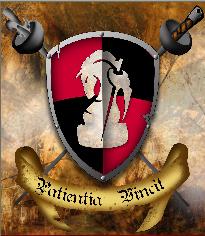Movie Reviews by Members:
Sunshine
Several years ago, a co-worker and movie buff
suggested this film to me. He said I should try it because, “it had some
fencing in it”! The co-worker advised it would be best to watch it on a
rainy weekend. Many months later, when it came up on Netflix on a cold rainy
Saturday, I finally sat down to watch Sunshine. I was not
disappointed.
The film chronicles a Hungarian Jewish
family through three generations of racial strife and political extremes.
The film, being a wonderful piece of historical fiction, spans two world
wars and sixty years. Hungary was ravaged after the fall of the monarchy to
communism, and then by the Nazi’s and finally the Soviets. In the middle of
all of this, Hungarian fencing clearly led the world. And many of the very
finest were Jewish Hungarians who fenced to gain acceptance in their own
country.
“I have to please my brother who wants to turn the
world upside down, and my father who wants to keep the world exactly as it
is!” said Ralpf Fiennes playing one of three characters of different
generations. The title ‘Sunshine’ translates roughly to ‘Sonnenschein’, the
families’ original name. To avoid the persecution of growing anti-semitism
in Hungrary, Ignatz, Gustave, and their cousin Valerie all change their
surname to Sors. Sors pronounced with a missing ‘c’ after the S.
This burdens Ralph Fiennes with three roles: that of
the grandfather Ignatz, the father Adam, and grandson Ivan Sors. It is
sometimes a little confusing; especially so when there is the occasional
voice-over narration by grandson Ivan, clearly in the voice of Fiennes. But
strangely it all seems to work, putting Fiennes in the role of the tragic figure
who loses all but emerges alive and wiser. Except in this case the tragic
figure is the Sonnenschein family. Fiennes manages it well, delivering three
sharply etched roles.
Another casting trick includes Jennifer Ehle, the
real-life daughter of Rosemary Harris, to play the young Valerie Sors,
leaving her mother to play the older Valerie that lives on through much of
the story.
Never stoic and certainly not a delivery of cold
history, Sunshine is a flesh and blood story with much of the human element
in the film. There is a steamy relationship and marriage between cousins.
Very difficult to get approval for that in those days. Others
have adulterous relationships and you may wonder why Szabó includes it.
Perhaps he put it there to never let us forget they were not a statistic but
human in every way.
At a grand length of 181 minutes, it’s not a short
film. It has the feel of the epic films of the sixties, while the subject
matter, in a modern style, is filmed raw and unabated. What followed that
Saturday was a film that relates most poignantly and strikingly similar to our own modern times.
Yes, there was fencing in it, but there was so much more. Written and
directed by successful film maker István Szabó, Sunshine was one of several
notable achievements that included, Mephisto, Colonel Redl, Taking Sides,
and Being Julia.
The production does have a powerful fencing story in
it, and it’s particularly relevant. Past the mid-way point I realized the
fencing part of this film reminded of a story I had already heard. Not
exactly the same story, but a reminder nonetheless. Looking back at the
film, the whole thing feels like a poignant reminder. Something that
should never be forgotten, but sadly will. As generations race
forward, leaving history in their wake, some of the same mistakes will
tragically be repeated.
The Fencing Story behind Sunshine:
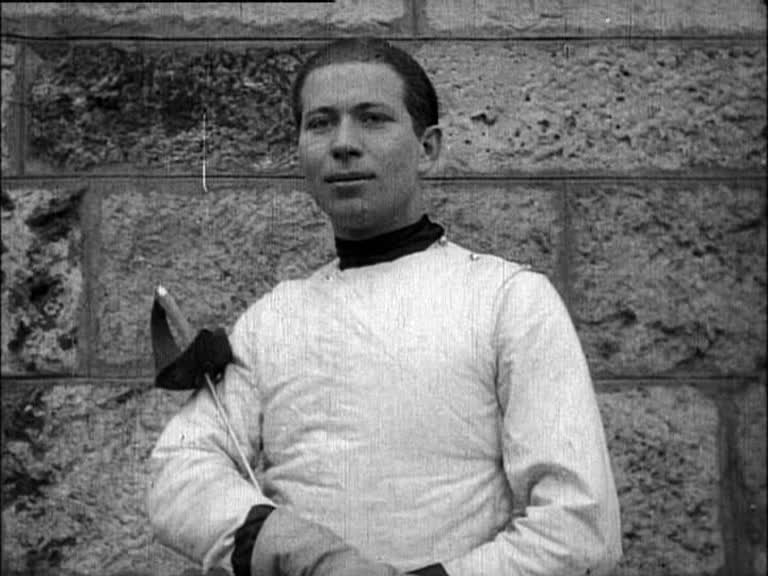
Atilla Petschauer
Atilla Petschauer won gold in the 1928 Olympics
for team sabre and individual silver. He won again in the 1932 Olympics for
Hungarian team Sabre. He was, through the twenties, regarded as one the
finest Sabre fencers in the world. Not a movie about fencing,
Sunshine tells us a powerful story of fencing with chilling scenes that will
haunt the viewer once the full tale is revealed. The fencing character of
Adam Sors, who is the middle son of three generations of Sors, is generally
agreed to be modeled after the famous fencer Atilla Petschauer. Viewers will
no-doubt remember the scene in the prison camp that depicts the fate of Sors.
According to a witness in the prison, this scene closely describes the fate
of Petschauer and how he died.
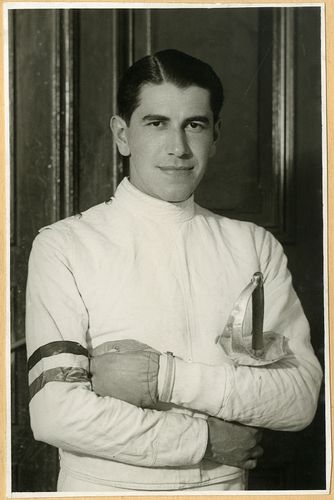
Endre Kabos
Not always afforded the benefit of fencing at the
best Military clubs, Hungarian Jewish fencers rallied around the instruction
of the famous Italian master Italo Santelli to achieve a record in fencing
that may never be equaled. Endre Kabos, from all accounts, was an
excellent person as well as an excellent sabre fencer. He was also lost
during this time as well. And also at the hands of the Nazi occupiers. Kabos
won team Gold and Individual Bronze at Los Angeles in the 1932 Olympics. He
beat that record in 1936 with Individual Gold and team Gold in Berlin. The
role of Adam Sors also works allegorically to highlight many Hungarian
Jewish athletes whose lives were lost or destroyed during the Nazi, and
later Soviet, occupations.
We’re fortunate to have had some of this story
come to us directly from, one of Italo Santelli’s best students, Dr. Francis
Zold. Zold knew Kabos and Petshauer well, and spoke with Kabos just
minutes before his death on the Margarit bridge. As many of you know, Dr.
Zold was Ben Little’s coach and mentor at USC.

György Piller
Winner of the 1932 Olympics Gold medal in Sabre,
and the man who would captain the Hungarian team in later years, was
György Piller.
An outstanding video of his life
and summary of his fencing career is presented by the West Coast Fencing
Archive.
György Piller - The
Last Captain
Using the best of the Hungarian and Italian
methods, the Hungarians continued to be a dominant world power in fencing
for years after the 1936 Olympics. In 1956 as Soviet troops and tanks
rushed into Hungary, to quickly put down acts of revolution, the Hungarian
fencing team was making good their escape to attend the Olympic games in
Melbourne Australia.
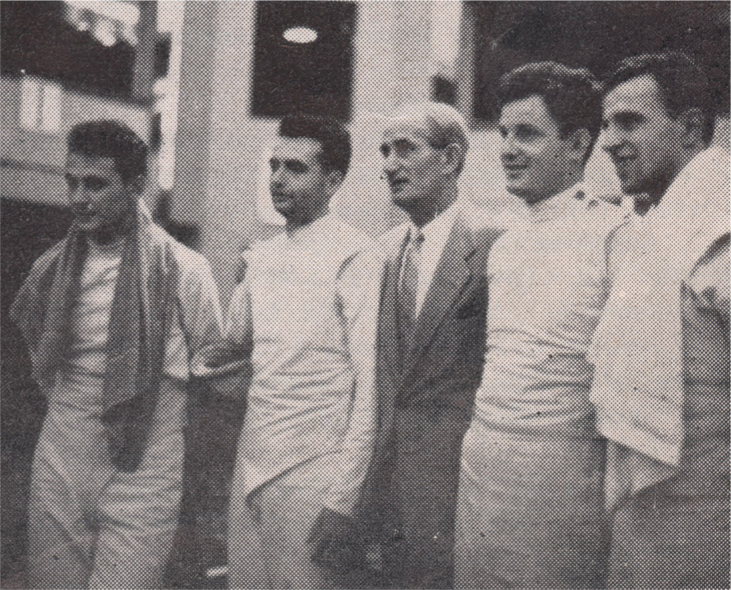
With the help of Piller (center), the Hungarians
won team Gold at the 1956 Melbourne Olympics. Daniel Magay on the the
left and Eugene Hamori stand alongside their captain. Along with Tom
Orley on the far left and Csaba Pallaghy on the far right, all would
immigrate to America and continue fencing.
American sabre fencing was transformed overnight
by the Hungarian presence. With coaches
like
György
Piller, Istvan Danosi, and Csaba Elthes things were
certainly looking up for American sabre fencing. Alex Orban, Tom Orley,
Atilla Keresztes, Eugene Hamori, Csaba Pallaghy, George Domolky – all
finished up and down the list of National Sabre finalists for the next 15
years.
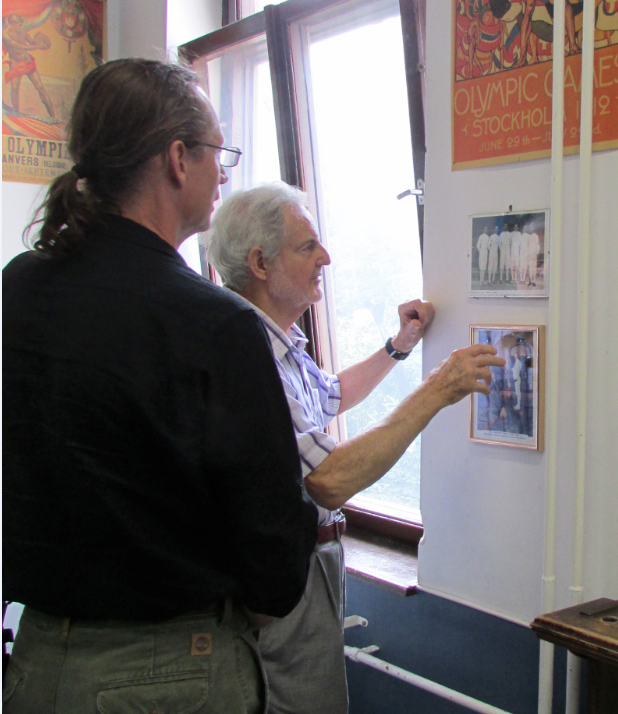
Reflections
Eugene Hamori looks with fondness at a picture of
the Hungarian team at the 1932 Olympics. In the center is his
old instructor Piller flanked by Petshauer and Kabos.
Ben Little, A student of yet another generation, looks on.
A few of the many links on this subject:
https://www.nybooks.com/articles/2000/10/19/duels-in-the-sunshine/
https://en.wikipedia.org/wiki/Attila_Petschauer
https://en.wikipedia.org/wiki/Endre_Kabos
https://www.westcoastfencingarchive.com/2019/04/29/daniel-magay-part-2/
https://tulanegreenwave.com/news/2004/7/30/Prof_Remembers_56_Olympics
Olympic Fencing Records
Men's Sabre
events 1928
Book
Reviews by Members:
Swordspoint, The Privilege of the Sword and The Fall
of the Kings: Emil Luft:
The books
are: Swordspoint, The Privilege of the Sword and The Fall
of the Kings. The first two are written by Ellen Kushner and the last
one is by Ellen and Della Sherman.
Swordspoint is a tale of intrigue and danger, of
romance and power, of nobles, students and pickpockets in a city that
settles disputes by the sword. The romance and some love scenes are between
males, so it may not be for everyone. I would give it an R rating. I believe
it won some book awards
The Privilege of the Sword (what a great title!) was the first book I
read and I re-read it again after I read Swordspoint. It is a witty
and wonderful book with great characters. It introduces Katherine, a
well-bred country girl versed in the rules of conventional society into
Riverside where the aristocratic and ambitious battle for power in the
city's ball rooms, brothels and boudoirs. Katherine's uncle Alec Campion,
a.k.a. the Mad Duke Tremontaine, to whom rules do not apply, decides it
would be more amusing for his niece to learn swordplay than
to follow the usual path to marriage and her world changes forever. Blade in
hand it is up to Katherine to navigate a maze of secrets and scoundrels and
to gain the self-discovery that comes to those who master The Privilege
of the Sword.
The Fall of the Kings is the follow-up. It is about
Theron Campion the heir to an ancient house. It is set in the same world of
intrigue against a rich tapestry of artists, scholars, students, strumpets
and spies.
Normally there is no PG-14 or R rating on books. I think
these 3 books should be rated R, but maybe I am too conservative.
(HEMA) Fencing -- Swordplay tactics and practical movements
Recommend using VLC Media Player (free download)
Note: Video download may take a few minutes.
Archer
vs Fencer (youtube)
Fior_Di_Battaglia (The Guards of the Sword) (youtube)
The Parry by Chad Scales:
Click to View
Huntsville Fencing; Always a flurry of activity!
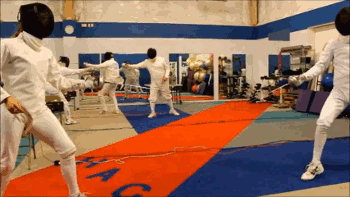
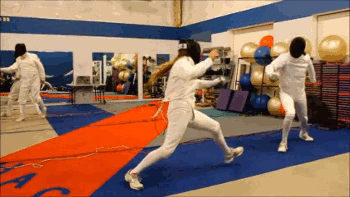
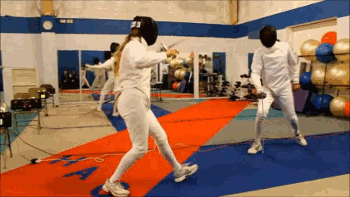
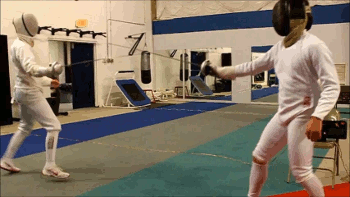
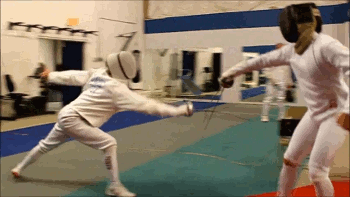
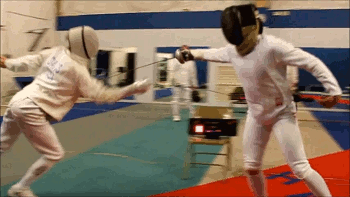
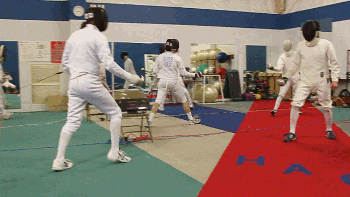
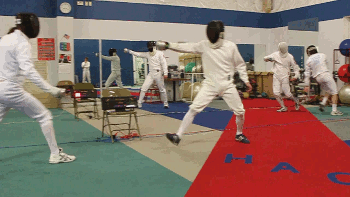
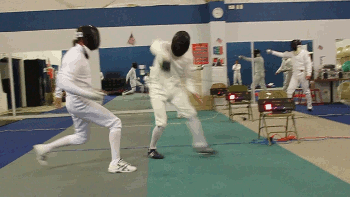
Check out repair article by Dave
epee_troubleshooting.pdf
